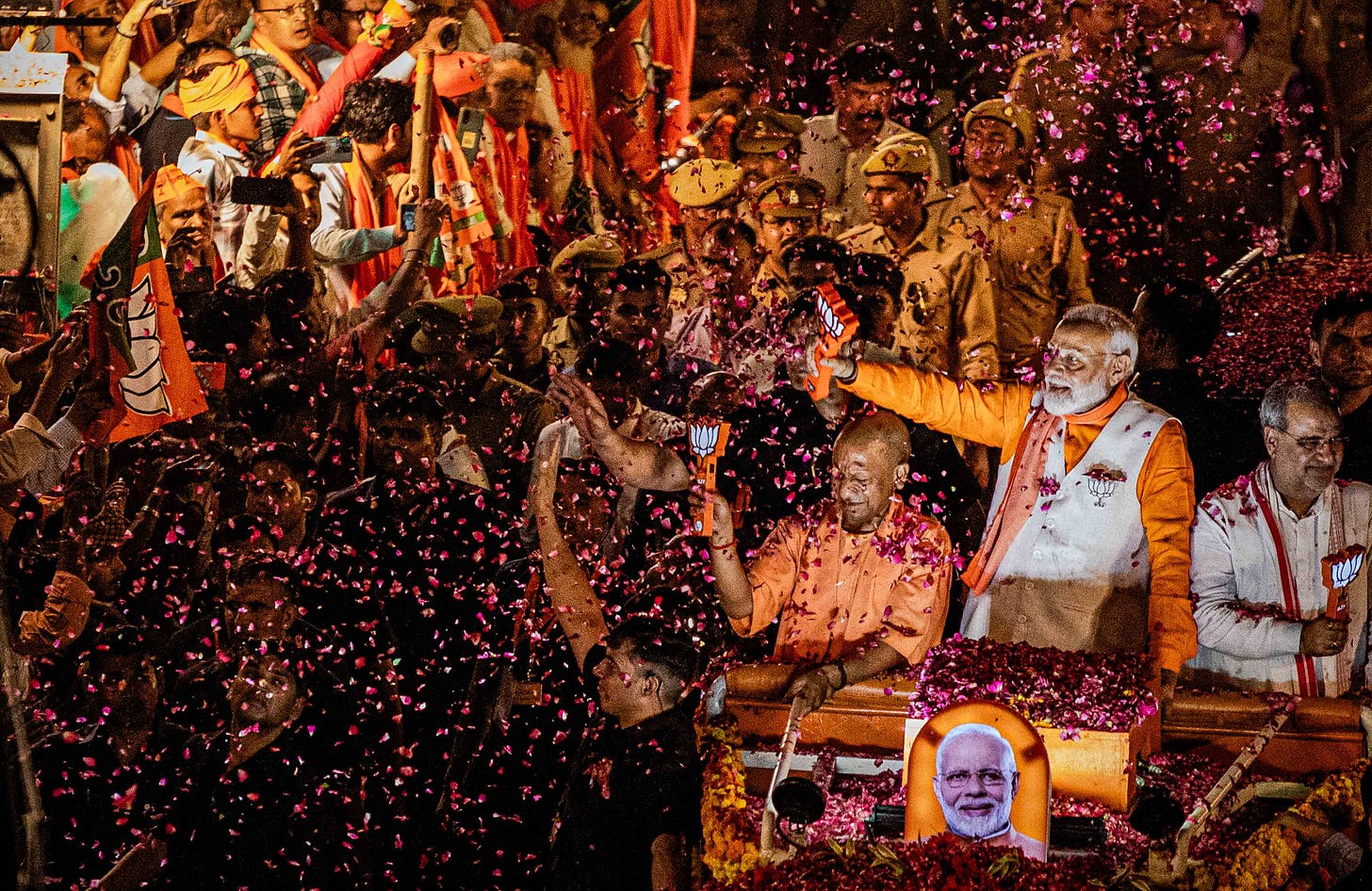Field Guide Vol. 250
In Norway if you want to say something is crazy, you say “That’s so Texas!” In spite of what Google Translate might have us think, language is more than a mere tool for communication. It’s always been a vessel of culture, history and identity. The vocabulary, idioms and grammar we use are constantly evolving as power shifts and circumstances change. Different languages have been celebrated and weaponized. Minority languages have long been targeted in efforts to enforce cultural uniformity and mold communities; in recent decades, a number of these languages have also been reclaimed and become dominant in places they were once suppressed.
In this week’s Field Guide, journey with us to Nigeria, India, France and elsewhere, as we explore the vital roles that languages play in preserving traditions, fostering connections and shaping communities, as well as the struggles in some places to keep a linguistic heritage alive.
Indian Prime minister Narendra Modi waves to supporters in Varanasi, India during the 2024 general election. 2024. Photograph by Ritesh Shukla. (Getty Images).
My Mother Tongues
By Shougat Dasgupta
This piece is published in collaboration with Coda Story as part of our Complicating Colonialism issue.
Growing up in Kuwait, I learned two things about India that seemed essential: one must be able to identify one’s “native place” and one’s “mother tongue.” My native place certainly wasn’t Kuwait—as the child of expatriates, Kuwait was merely purgatorial, a place to endure before I moved on—while Bombay, where I was born, felt intimidating, removed. I left the city before I was two months old, experiencing it only in vivid bursts during school holidays—experiencing it, in other words, as a gawping outsider, a stranger with privileged access. Somewhere between them, my native place was an imaginary homeland, a ramshackle, cobbled-together country that had no room for any other citizen.
A stranger with privileged access… that was also how I felt about my relationship with Bengali. It was my mother tongue, I suppose, though I never learned to read nor write it—that we did in English. Instead, I learned Bengali by osmosis, by hearing it around me. And in time I could speak it myself, after a fashion, holding conversations that, while fluent enough, immediately marked me out as a foreigner. My mother, as a result of being a native of polyglot Bombay, spoke other Indian languages—Gujarati and Marathi in particular. Both are languages that I could literally describe as my mother tongues and both are languages that I do not speak; I understand more or less everything that is said but cannot respond in kind, at once an insider and also irredeemably an outsider.
For my parents and their friends, English served a professional function and their relationship with it was suitably unemotional, uninvolved, disinterested. The meaningful parts of their lives were conducted in Bengali, the language in which they dreamed, they sang, they quarreled, and, as Bengalis will, in which they talked and talked and talked … and talked. Except with us, their children, with whom they sometimes switched to a stiff English, like they might do to be polite when a foreigner crashes their party. Growing up, Bengali’s rhythms, its soft, rotund soundscape were intimately familiar, yet out of reach.
It’s a peculiar condition to have to explain this failure to belong to a place, to a tongue. Thiong’o, writing about his life in Kenya, makes the distinction between the Gĩkũyũ he spoke as a child and the English that was thrust upon him at his colonial school. “The language of my education,” he writes, “was no longer the language of my culture.” If the “bullet was the means of the physical subjugation,” Thiong’o recognized, language “was the means of the spiritual subjugation.”
African writers, Thiong’o argued, were making a choice when they wrote in the colonizer’s language. They chose to enrich English, say, or French, at the expense of their mother tongues, effectively shrinking their own mental universe while expanding colonial dominance. The masters my parents were serving when they chose to effectively disinherit me from my linguistic birthright were not literally the British, but the colonial legacy was present in global systems of capital and trade. India may have become independent, but Indians like my parents remained convinced that achieving fluency in the colonizers’ ways was the surest path to worldly success.
And they were right. My itinerancy, more optimistically described as my cosmopolitanism, has helped secure a place among the global bourgeoisie, that spectral class that moves ceaselessly from city to city, living more or less the same way in each, a comfortable income a buffer against any discomfiting encounters with geographic and cultural specificities. Life as a blur of iPhones, Netflix subscriptions, and Boba tea orders.
English, of course, is the common language of this globalized class. In India, where I have lived with my wife and children for about a dozen years, speaking English as my first language makes me a member of a tiny elite—about 300,000 people in a country of 1.4 billion, according to the last census (2011). Over 120 million Indians speak English as either a second or third language. English, even now in India, is the preserve of the educated, the urban, the middle class and upper caste; and the more easily, idiomatically, and naturally you speak English, the more privileged you likely are. It’s an uncomfortable truth in postcolonial India that the speakers of the colonizer’s language have clung so fast to the trappings of power and continue to wield influence out of all proportion to their actual number. But it’s an equally uncomfortable truth, as I’ll discuss later, that in today’s Hindu nationalist India, English is a vital bulwark, a defense of pluralism against the imposition of a single Indian language on a country with dozens of mother tongues.
Keep reading with a 7-day free trial
Subscribe to Stranger's Guide to keep reading this post and get 7 days of free access to the full post archives.




